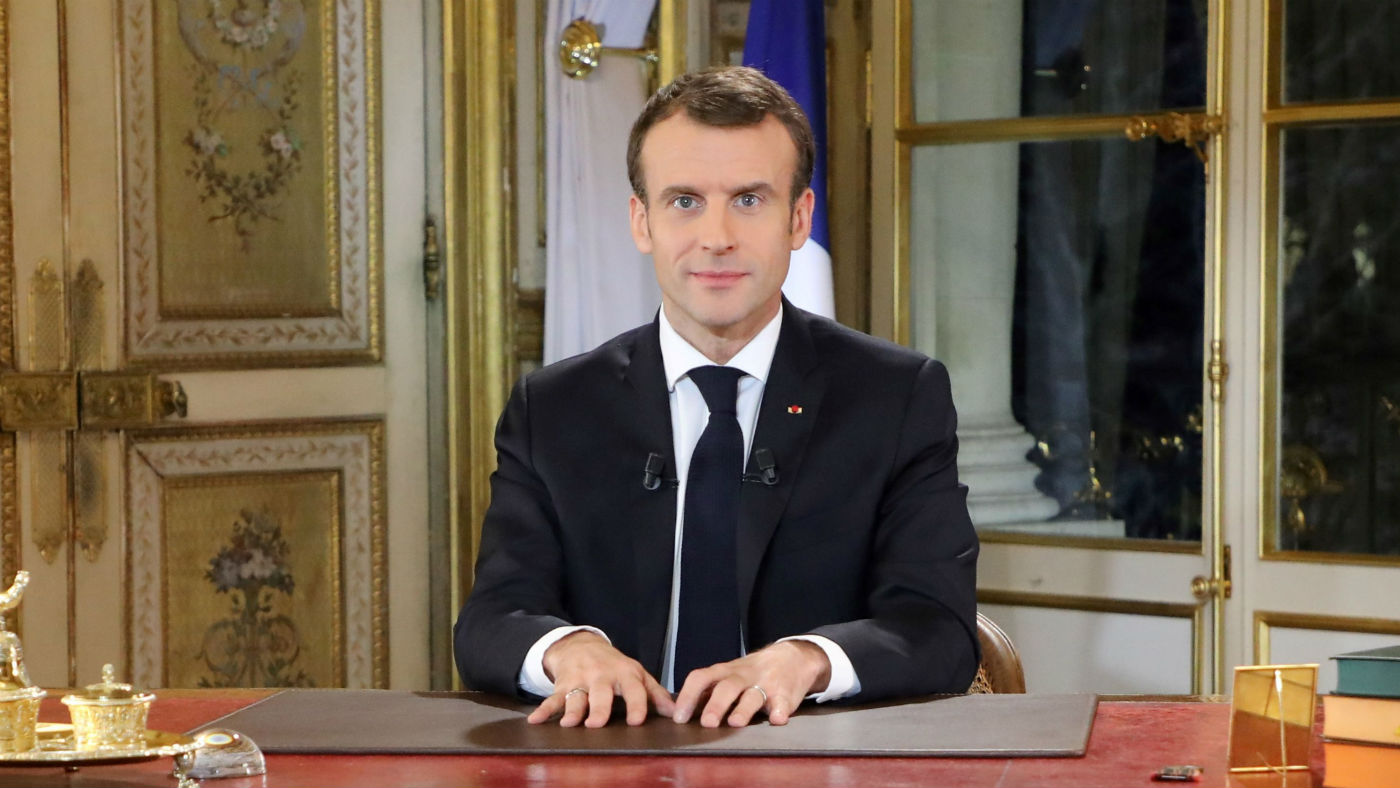Emmanuel Macron to face no confidence vote
Left-leaning lawmakers table motion as economic concessions threaten president’s reform agenda

A free daily email with the biggest news stories of the day – and the best features from TheWeek.com
You are now subscribed
Your newsletter sign-up was successful
French President Emmanuel Macron is to face a vote of no confidence in the country’s National Assembly, less than 24 hours after his British counterpart faced down her own leadership challenge.
Following a month of civil unrest over his economic policies, left-wing lawmakers from the French Communist Party, the Socialist Party and the far-left populist movement France Unbowed (La France Insoumise) have tabled a motion of no confidence in the French government.
Bloomberg says “while the administration has little chance to lose given its majority, it will force the premier to detail his budgetary plans for 2019”.
The Week
Escape your echo chamber. Get the facts behind the news, plus analysis from multiple perspectives.

Sign up for The Week's Free Newsletters
From our morning news briefing to a weekly Good News Newsletter, get the best of The Week delivered directly to your inbox.
From our morning news briefing to a weekly Good News Newsletter, get the best of The Week delivered directly to your inbox.
Prime Minister Edouard Philippe will reveal plans for next year’s spending during a keynote speech ahead of Thursday’s confidence vote.
Philippe’s “backing for Macron’s increased spending to defuse the Yellow Vest protest, which may represent about 10 billion euros, could push the deficit up to around 3.4% of gross domestic product, in a signal that containing the month-long crisis will take priority over European Union budget rules”, says Bloomberg.
The Sun says there are fears that concessions by Macron “are set to blow out the French deficit”, with Reuters reporting that France is on course to overshoot the European Union’s budget deficit ceiling next year without new spending cuts after Macron caved in to anti-government street protests.
Among the concessions announced by the president on Monday were a rise in the minimum wage, tax-free overtime pay, a tax cut for pensioners and a freeze of planned fuel tax hikes, due to kick in on 1 January.
A free daily email with the biggest news stories of the day – and the best features from TheWeek.com
“The knock-on effect to the French budget did not go unnoticed by bond markets,” says CNBC.
At one point on Tuesday the spread between France and German ten-year bonds – seen as an indicator of risk sentiment – reached its widest since May 2017.
Ambrose Evans-Pritchard in The Daily Telegraph writes that Macron’s bid to buy off France’s “gilets jaunes” protesters with instant budget handouts “threatens to blast through eurozone’s fiscal limits, fatally damaging his credibility as the champion of the European project and the guardian of French public accounts”.
He adds: “The package of short-term measures announced in a theatrical mea culpa on Monday night leaves President Macron’s putative ‘grand bargain’ with Germany in tatters.”
Macron has insisted he will not back down on his wider reform agenda in the face of the protests.
“Whether that will be enough to avert a so-called ‘Act V’ of demonstrations this weekend remains to be seen - as the concessions have already been written off by some as half-measures,” says The Sun.
The no confidence vote comes just a day after Prime Minister Theresa May faced a no confidence vote from her own party in Westminster. She won the ballot by 200 votes to 117, but has been left in a much weaker position.
-
 Nuuk becomes ground zero for Greenland’s diplomatic straits
Nuuk becomes ground zero for Greenland’s diplomatic straitsIN THE SPOTLIGHT A flurry of new consular activity in the remote Danish protectorate shows how important Greenland has become to Europeans’ anxiety about American imperialism
-
 ‘This is something that happens all too often’
‘This is something that happens all too often’Instant Opinion Opinion, comment and editorials of the day
-
 House votes to end Trump’s Canada tariffs
House votes to end Trump’s Canada tariffsSpeed Read Six Republicans joined with Democrats to repeal the president’s tariffs
-
 Nuuk becomes ground zero for Greenland’s diplomatic straits
Nuuk becomes ground zero for Greenland’s diplomatic straitsIN THE SPOTLIGHT A flurry of new consular activity in the remote Danish protectorate shows how important Greenland has become to Europeans’ anxiety about American imperialism
-
 Epstein files topple law CEO, roil UK government
Epstein files topple law CEO, roil UK governmentSpeed Read Peter Mandelson, Britain’s former ambassador to the US, is caught up in the scandal
-
 Iran and US prepare to meet after skirmishes
Iran and US prepare to meet after skirmishesSpeed Read The incident comes amid heightened tensions in the Middle East
-
 Israel retrieves final hostage’s body from Gaza
Israel retrieves final hostage’s body from GazaSpeed Read The 24-year-old police officer was killed during the initial Hamas attack
-
 China’s Xi targets top general in growing purge
China’s Xi targets top general in growing purgeSpeed Read Zhang Youxia is being investigated over ‘grave violations’ of the law
-
 Panama and Canada are negotiating over a crucial copper mine
Panama and Canada are negotiating over a crucial copper mineIn the Spotlight Panama is set to make a final decision on the mine this summer
-
 Why Greenland’s natural resources are nearly impossible to mine
Why Greenland’s natural resources are nearly impossible to mineThe Explainer The country’s natural landscape makes the task extremely difficult
-
 Iran cuts internet as protests escalate
Iran cuts internet as protests escalateSpeed Reada Government buildings across the country have been set on fire